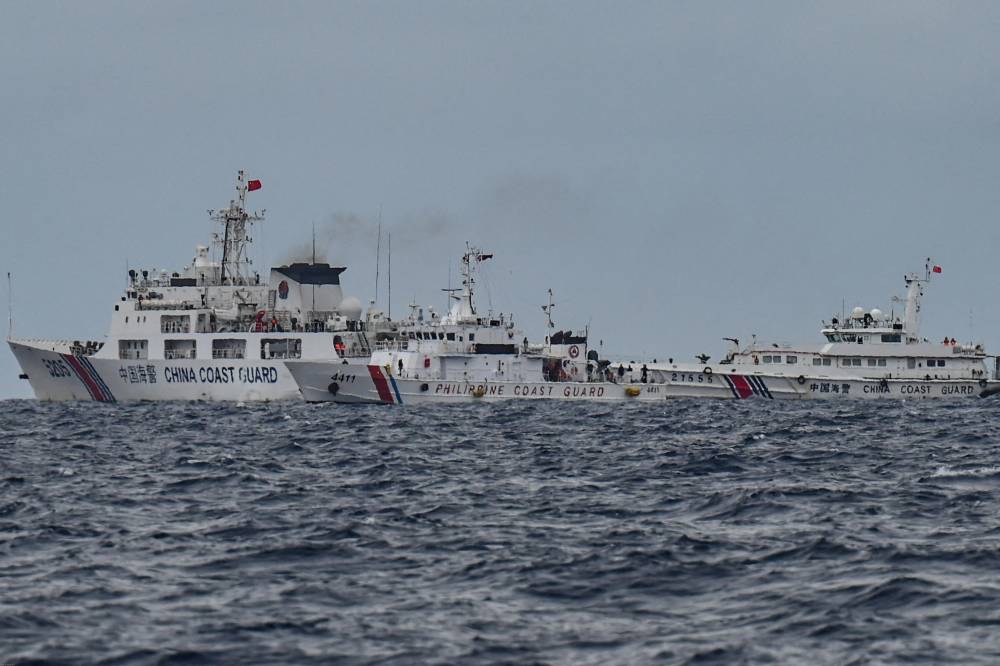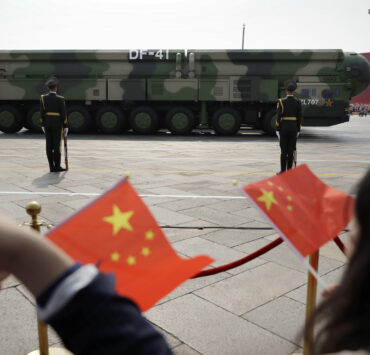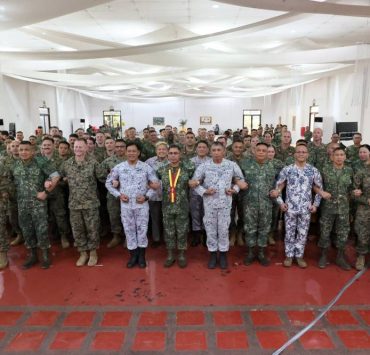Defense chief doubts Beijing’s sincerity in talks on SCS code of conduct

The Philippines is looking forward to “good faith discussions” with China to a regional code of conduct in the South China Sea (SCS), but Defense Secretary Gilberto Teodoro Jr. says he doubts China’s sincerity.
“They say they’re committed to a dialogue on condition that it’s based on historical facts. What kind of dialogue is that? It’s a monologue and they’re the only ones who believe what they’re saying,” he told reporters on the sidelines of the Asia-Pacific Ministerial Conference on Disaster Risk Reduction in Manila on Monday.
“Right now, honestly speaking, I do not see that,” he said, referring to China’s sincerity in the negotiations.
Teodoro was referring to the so-called nine-dash line that serves as the basis for Beijing’s claims on nearly the entire South China Sea, including areas internationally recognized as part of the West Philippine Sea and the territorial waters of Brunei, Indonesia, Malaysia and Vietnam.
The historical line, which was officially adopted by China in 1947, is made up of nine dashes that extends from the Chinese mainland far into the South China Sea, encircling the disputed Spratly Islands and Paracel Islands and overlapping with the coastal waters of the Philippines and Vietnam.
China claims the entire area bound by the line and insists it “has indisputable sovereignty over the islands … and the adjacent waters, and enjoys indisputable sovereign rights and jurisdiction over the relevant waters as well as the seabed and subsoil thereof.”
Arbitral ruling
The Philippines and other neighboring countries as well as the international community disagrees with such a claim.
The Philippines brought a case against China at the arbitral tribunal in The Hague, which was created under the 1982 United Nations Convention on the Law of the Sea (Unclos), and in 2016 got a favorable ruling that the nine-dash line had no validity under both the Unclos and general international law.
China has rejected the ruling and continues to assert its claims in the South China Sea by building artificial islands in the area and harassing fishers operating within or adjacent to the line.
It also deployed an armada of coast guard vessels to protect what it considers its territory, hundreds of kilometers off its mainland.
The Philippines has complained of Chinese vessels’ use of water cannon, collision and ramming tactics to stop resupply and patrol missions in disputed waters.
Slow progress
Southeast Asian leaders called on Sunday for swift agreement on a code of conduct for the South China Sea based on international law, after escalating confrontations in the strategic waterway where $3-trillion worth of trade passes annually.
A statement of the Association of Southeast Asian Nations (Asean) stressed the need for dialogue.
“We look forward to good faith discussions and the President has given the marching order that he looks forward to good faith discussions and we will comply,” Teodoro said.
According to a report by Japanese broadcaster NHK, President Marcos called on Asean and China at his intervention during the Asean Leaders Retreat at the Asean-China summit in Laos last week, to fast-track the code of conduct and urged Asean leaders “not to turn a blind eye to the aggressive, coercive and illegal actions of an external power against an Asean member state,” without mentioning any particular country.
Mr. Marcos declined to confirm the report, saying he would not disclose matters discussed during the closed door session.
The maritime code, which could help avoid such confrontations and prevent conflict, was committed by China way back in 2002 but talks led by Asean have made slow progress.
In November last year, Mr. Marcos said the Philippines had approached other Asean countries with territorial disputes with the Philippines, including Vietnam and Malaysia, “to make our own code of conduct.”
He expressed frustration at the slow pace of talks on a code of conduct with China, noting that negotiations on its contents were still yet to get underway and concerns about the extent to which China was committed to a binding set of rules.
Tensions in the South China Sea require the Philippines to partner with allies and neighbors to maintain peace there, including establishing codes of conduct as the situation becomes “more dire,” Mr. Marcos said. —WITH A REPORT FROM REUTERS

















